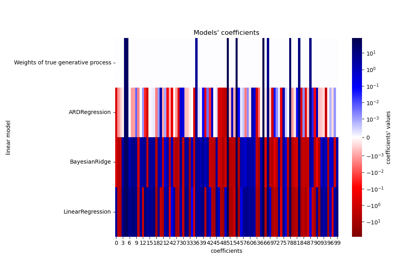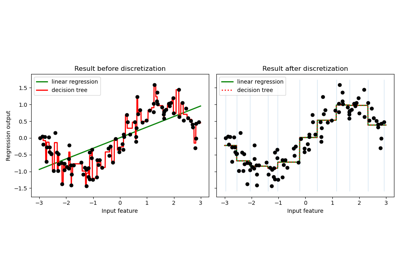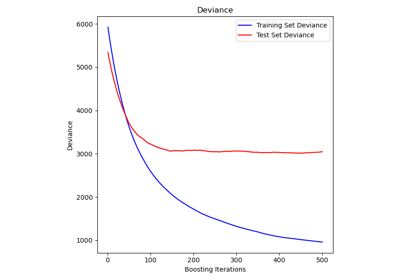注意
转到末尾 下载完整的示例代码或通过 JupyterLite 或 Binder 在浏览器中运行此示例。
使用贝叶斯岭回归进行曲线拟合#
计算正弦曲线的贝叶斯岭回归。
有关回归器的更多信息,请参阅贝叶斯岭回归。
一般来说,当使用贝叶斯岭回归通过多项式拟合曲线时,正则化参数 (alpha, lambda) 初始值的选择可能很重要。这是因为正则化参数是通过依赖于初始值的迭代过程确定的。
在此示例中,使用不同的初始值对来通过多项式逼近正弦曲线。
当从默认值开始时(alpha_init = 1.90,lambda_init = 1.),所得曲线的偏差很大,方差很小。因此,lambda_init 应该相对较小 (1.e-3) 以减少偏差。
此外,通过评估这些模型的对数边际似然 (L),我们可以确定哪个更好。可以得出结论,具有更大 L 的模型更可能。
# Authors: The scikit-learn developers
# SPDX-License-Identifier: BSD-3-Clause
生成带有噪声的正弦数据#
import numpy as np
def func(x):
return np.sin(2 * np.pi * x)
size = 25
rng = np.random.RandomState(1234)
x_train = rng.uniform(0.0, 1.0, size)
y_train = func(x_train) + rng.normal(scale=0.1, size=size)
x_test = np.linspace(0.0, 1.0, 100)
通过三次多项式拟合#
from sklearn.linear_model import BayesianRidge
n_order = 3
X_train = np.vander(x_train, n_order + 1, increasing=True)
X_test = np.vander(x_test, n_order + 1, increasing=True)
reg = BayesianRidge(tol=1e-6, fit_intercept=False, compute_score=True)
绘制真实曲线和预测曲线以及对数边际似然 (L)#
import matplotlib.pyplot as plt
fig, axes = plt.subplots(1, 2, figsize=(8, 4))
for i, ax in enumerate(axes):
# Bayesian ridge regression with different initial value pairs
if i == 0:
init = [1 / np.var(y_train), 1.0] # Default values
elif i == 1:
init = [1.0, 1e-3]
reg.set_params(alpha_init=init[0], lambda_init=init[1])
reg.fit(X_train, y_train)
ymean, ystd = reg.predict(X_test, return_std=True)
ax.plot(x_test, func(x_test), color="blue", label="sin($2\\pi x$)")
ax.scatter(x_train, y_train, s=50, alpha=0.5, label="observation")
ax.plot(x_test, ymean, color="red", label="predict mean")
ax.fill_between(
x_test, ymean - ystd, ymean + ystd, color="pink", alpha=0.5, label="predict std"
)
ax.set_ylim(-1.3, 1.3)
ax.legend()
title = "$\\alpha$_init$={:.2f},\\ \\lambda$_init$={}$".format(init[0], init[1])
if i == 0:
title += " (Default)"
ax.set_title(title, fontsize=12)
text = "$\\alpha={:.1f}$\n$\\lambda={:.3f}$\n$L={:.1f}$".format(
reg.alpha_, reg.lambda_, reg.scores_[-1]
)
ax.text(0.05, -1.0, text, fontsize=12)
plt.tight_layout()
plt.show()

脚本总运行时间: (0 分钟 0.229 秒)
相关示例



